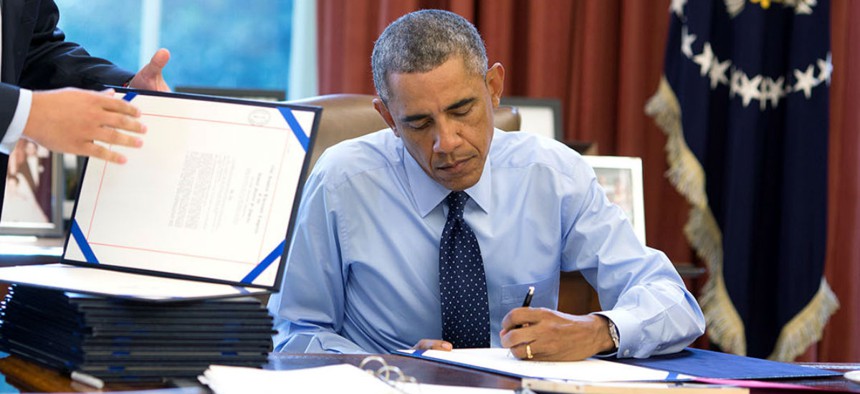
President Obama signs bills in the Oval Office in September 2014. Official White House Photo by Pete Souza
Contractors to Obama: Enough With the Executive Orders
Protest comes amid reports of plan to require contractors to offer paid sick leave.
On the heels of a news leak about a pending presidential directive requiring federal contractors to offer paid sick leave, four major contractor groups on Tuesday wrote to top White House officials asking them to ease up on executive orders “for the foreseeable future.”
With the White House issuing more contractor-specific orders, the “rapid growth in compliance requirements is becoming untenable,” said the letter to Chief of Staff Denis McDonough and Senior Adviser Valerie Jarrett. “The impacts, inefficiencies, and in many cases, unintended consequences are such that the interests of the American taxpayer are being significantly and negatively impacted.”
Signed by presidents of the National Defense Industrial Association, the Aerospace Industries Association, the Professional Services Council and the IT Alliance for Public Sector, the letter notes that since 2009, the White House has issued 12 contractor-focused executive orders that have led to 16 new regulations, “adding thousands of pages of new requirements to an already complex federal acquisition system, which contractors must navigate.”
More executive orders affecting contractors are expected, the associations said. Though some orders have won support from contractors or suggestions for improvements, “the net effect has been to significantly increase the costs of doing business with the government,” including “substantial investments in time and systems during a period of extreme budget pressure with very little benefit for the government.”
The association argued that innovation may suffer because these “unique and costly requirements” are raising a “substantial barrier between the commercial and government marketplaces,” cutting the government off from key solutions.
The next pending order, according to an Aug. 6 report in The New York Times, would require federal contractors and subcontractors to pay employees for at least 56 hours of annual sick leave, allowing the time to carry over year to year. Employees—who could number in hundreds of thousands nationwide—could use the leave to care for a sick child or close relative, or to deal with family crises such as domestic violence, as long as the leave is used for medical care or preparing for legal actions. They would be guaranteed their jobs back.
Though the Times reported the signing of the order as imminent last week, Labor Department public affairs officer Dori Henry told Government Executive the department cannot confirm that such an order is coming. “The administration continues to look for ways to strengthen the middle class, and we have long expressed support for expanding access to paid sick and family leave to more workers,” she said. “In the absence of action from Congress on this issue, we continue to explore ways to expand access to paid leave. At this time, no final decisions have been made on specific policy announcements.”







